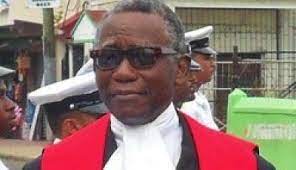By Emmanuel Saffa Abdulai (PhD)
Now that the dust has settled and the eulogies have simmered down let me pay tribute to a man I once referred to as my mentor — Abdulai O Conteh. His mentorship was not just a title but a profound influence that shaped my understanding of the law. This great son of the soil passed away earlier this month, leaving behind a legacy that has impacted the legal community in Sierra Leone.
I will not write about his achievements worldwide, as various writers have covered that. Suffice it to say he was a Sierra Leonean legal intellectual, former Vice President, Minister of Foreign Affairs, Minister of Finance, Attorney General and Minister of Justice, parliamentarian, constitutionalist, law lecturer, Chief Justice of Belize, Justice of the Court of Appeal of the Cayman Islands, Justice of the Court of Appeal of the Bahamas, an erudite law professor, educator, and Supreme Court Justice.
Our relationship was not just professional but personal. I spent much time with him, and worked on several projects over the past four or five years. Our relationship started initially as one young student meeting this gigantic legal and academic countryman in 2005 at the Special Court for Sierra Leone. In fact, on that day, I met with two legends simultaneously. Peter Andersen, a press officer at the Special Court and my benefactor, introduced the legendary Dr Conteh to me. He immediately called me ”Torma” (Namesake) since I had the same Abdulai name, although Abdulai was his first name and my surname.
Peter Andersen was a Peace Corps Volunteer from September 1979 (including two months of training in Jimmi Bagbo) to December 1982 in Kainkordu, Soa Chiefdom, Kono District. He was an agricultural volunteer and even had a nominal position within the Ministry of Agriculture and Forestry as an AI (Agriculture Instructor). Peter returned to work for the Special Court. He built the first website dedicated to news on Sierra Leone when news on the war was scarce. The invaluable Sierra Leone website became a depository for many things, including the laws of Sierra Leone.
Dr Conteh never once called me anything other than Saffa. I often wondered why, but later learned it was in memory of the late CPO Saffa, the former inspector General of Police who was criticised for his heavy-handedness in law enforcement.
Dr. Conteh’s humility was a shining example. He graciously exchanged emails with me, and occasionally shared his landmark rulings when he benched in the Caribbean. I remember writing a critique of his essay on the 1991 Constitution as a rookie law student and emailed it to him. His response was a testament to his approachability and willingness to learn from others. He said, ‘It was just an essay to allow people like you to appreciate the Constitution.’ He was ‘glad you disagree with me and think much needs to be done.’ Even though I hadn’t yet passed constitutional law, this legal giant encouraged me to critique his work, inspiring me with his humility and openness.
Dr. Conteh’s willingness to guide and mentor was evident during the Abdallah case. This case, a landmark in Sierra Leone’s legal history, was a testament to Dr Conteh’s commitment to justice and his mentorship. I remember the day we went to his house, and his face lit up when I introduced myself. He remembered our exchanges but not my face. He asked my opinion on the case, and he agreed with me. I emailed him drafts of court papers, and we met many times to discuss my drafts, which he would entirely redraft. His appreciation of the law, especially constitutional law and judicial review, was unparalleled. Ultimately, we won the case, resulting from his guidance and hard work. I went to his house without Prof Abdallah and told him, ‘We won.’ He politely disagreed, saying, ‘You won the case. I only guided you, but you did everything.’ His generosity and support were invaluable, and I will always be grateful for his guidance.
During our discussions on the Abdallah case, I raised the idea of a journal on human rights law. He encouraged me to do it. I set up the journal, and he instantly agreed to be on the board. He even wrote the forward, and until recently, he had urged me on the phone, whenever he could talk, to continue to publish it. That human rights-focused journal has morphed into the Fourah Bay College Law Review. This prestigious publication serves as a platform for legal scholars and practitioners to share their insights and research in the field of human rights law.
During the Abdallah case, we talked about things outside of the case. The 1987 Treason Trial was one of those. After dodging the discussion for many months, he finally agreed to talk about it. This trial, a significant event in Sierra Leone’s history, was a turning point in Dr. Conteh’s career. It was a trial that involved high-profile political figures and had a profound impact on the country’s legal and political landscape. I asked him if it was off the record, and he told me it didn’t matter. He said he was a career lawyer working for the state. His business was to prosecute cases brought to him. He did his job and won. They celebrated his victory, and the file was closed and dusted. However, after the execution of FM Minah and others, he never got over it. He battled with the rightness of the death penalty and his romance with the dictatorship until the end of his life.
He said it remains a ‘scar on his conscience.’ I chipped in that it was an albatross around his neck. His face lit up, and he said, ‘Like the Ancient Mariner.’ That conversation ended awkwardly, and I said he had lived ‘the good, the bad, and the ugly’ of the law. By this, I meant that his career was not without its challenges and controversies, but it was also filled with triumphs and moments of profound impact. He agreed that ‘you could say so.’
Dr. Conteh’s commitment to justice and refusal to tolerate illegality were unwavering. When President Koroma dismissed his vice president, I extensively quoted Dr Conteh’s letter to President Koroma in my Newswatch Magazine. His response was clear and unwavering: ‘We allowed dictators in the past to get away with little things that emboldened them.’ He solemnly vowed to speak out against illegality, a testament to his strong moral compass and unwavering dedication to justice.
One conversation was about his Essays on the 1991 Constitution. This collection of essays, a significant work in constitutional law, reflected Dr Conteh’s deep understanding and critique of the Constitution. Like a trap, he asked me to drop his book on arbitration that I borrowed. We sat down at his library, and he told me the AFRC burned his well-stocked library, so he jealously guards his books for Aaron (his beloved son). Then, he asked me to discuss his essay. I told him his book was from a drafter’s point of view. He was defending the 1991 Constitution because he was the author. He agreed partly, but with wild eyes, he told me the Constitution was progressive. I agreed but retorted that it needed review. I pointed out some of its issues, and we agreed to disagree. Then he asked why I couldn’t review the 1991 Constitution and publish it. ‘You have such an insightful view of it and a good appreciation of constitutional law and constitutionalism.’ I agreed and started a manuscript that is now finished and awaiting a suitable publication time.
I started my doctoral studies in 2018. I focused my research on Constitutional and Administrative Law. When I told him, he was elated and sent me a list of must-read books. I interviewed him on the history of the judiciary and why independence is far-fetched. I still listen to the recorded answers. After my research, I suggested that the law faculty at FBC could do a podcast series on legality and constitutional history with him. He agreed, but we never got to it.
Recently, I had drifted away, and the last time I saw him was at a funeral at thr funeral of the mother of Prof Abdallah. He looked well but was frail in the company of his ever-loving and beautiful wife. We spoke briefly; he always asked me about the Renaissance Movement. He lamented and mourned the death or slumber of the movement.
Then I came face to face with him at the Supreme Court: The master and his student. My heart raced and thundered against my ribs. Intimidated by his presence, I was glad he decided to submit his argument in writing. I presented my case, and he left with Aaron by his side. We spoke that evening, and he was pleased with my presentation but said, “When I did the Treason Trial, I was proud of myself. I won but lived with it to date. You did excellent today, but I hope you will love the consequences.” That was the last time we spoke.
Dr Conteh was a legal giant, and he believed in the law. He had no boundaries and told me how he recently took Augustine Marrah under his tutorship to test the law and make it beautiful. He was very progressive, agreed to help times without count, and lent his name to anything innovative with the law. He spoke brilliantly against tribalism. He would tell me stories of how the judiciary slumped into an abyss that would never recover. He accepted that he played a part but was working to make things right in the twilight of his career. Only posterity will judge whether he succeeded.
The cotton tree never dies. It withers during the dry season, only to blossom during the rains. Dr. Conteh, my mentor, and friend, your legacy of “the good, the bad, and the ugly” of the law in Sierra Leone lives on.




